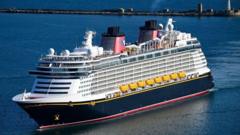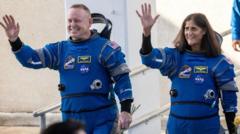SpaceX successfully launched four private astronauts from Florida aboard the Fram2 mission, marking a historical first in human space exploration. The mission, financed by cryptocurrency mogul Chun Wang, aims to deepen our understanding of Earth’s polar regions.
SpaceX Launches Historic Crewed Mission Over Earth's Poles

SpaceX Launches Historic Crewed Mission Over Earth's Poles
Four private astronauts embark on the groundbreaking Fram2 mission, making history as the first human spaceflight to traverse both poles.
SpaceX's rocket made history on Monday evening as it launched from Florida, marking the inaugural human orbit of both of Earth's poles during the Fram2 mission. The spacecraft, equipped with four private astronauts, will observe the planet from a unique polar perspective, beneficial for various applications including weather monitoring and mapping.
This mission is particularly notable as it allows human passengers to experience a path commonly utilized by satellites already in polar orbit. Experts indicated that while the technology has been effectively used by unmanned missions, sending humans along this route is a significant step forward in space exploration, though not unprecedented from a scientific standpoint.
Chun Wang, who made his wealth in cryptocurrency and blockchain technology, funded the mission and selected a diverse group of astronaut participants to join him. The team will voyage approximately 270 miles above Earth, repeatedly passing over both the North and South Poles over a planned duration of three to five days.
Wang, born in Tianjin, China, and now a citizen of Malta since 2023, marked the occasion with a personal twist—it was noted that his spacesuit displayed the Maltese flag. According to a statement from Fram2, this mission not only has the potential to advance human spaceflight but also aims to foster a deeper understanding of Earth's polar climates.
As the launch commenced, the world watched as it ventured into uncharted territories of human space exploration, inviting a sense of excitement and curiosity about the future possibilities such missions may unveil.


















